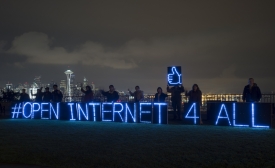internet freedom
In January 2010, secretary of state Hillary Clinton stood before the world and delivered a landmark address, calling the internet a “new nervous system for the planet.” She was describing an emerging State Department doctrine known as the “internet freedom agenda,” which built on a universal declaration that “people have the right to seek, receive, and impart information and ideas through any media and regardless of frontiers.”

If the inclusion of Internet freedom under human rights is contentious, digital rights might be the way forward.

The societal pros and cons of a life spent online.
The ABC has been embarrassed by self-censorship in Chinese language news items selected and posted on its AustraliaPlus.cn website. The broadcaster’s ABC International division recently admitted to Media Watch that the AustraliaPlus.cn website, with online penetration of China’s internet firewall to a potential audience of 700 million people, is actually meant to exclude news and current affairs, with the possible exception of business news.

Research on information and technology, directing the Center for Global Information Studies and a new book on cyber warfare.
The world is choosing sides in a fight over what the Internet will look like in the years to come. In recent months, countries have rushed to sign cybersecurity pacts that not only secure cyberspace allies, but also promote their vision of the global Internet.
Recent years have brought many prominent examples of political mobilization online, but most future growth in Internet users will come in countries with repressive and authoritarian regimes. Some democracies are attempting to mobilize soft power to reinforce real security concerns about less-than-friendly regimes around the world, and especially in Asia.







